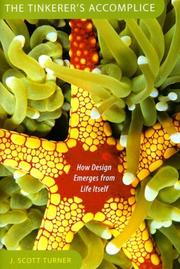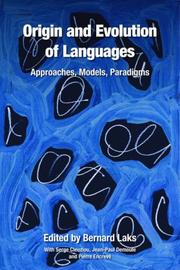| Listing 1 - 10 of 21 | << page >> |
Sort by
|

ISBN: 0674044487 9780674044487 0674023536 9780674023536 0674267869 9780674267862 Year: 2009 Publisher: Cambridge, MA
Abstract | Keywords | Export | Availability | Bookmark
 Loading...
Loading...Choose an application
- Reference Manager
- EndNote
- RefWorks (Direct export to RefWorks)
Physiologist Scott Turner argues eloquently that the apparent design we see in the living world only makes sense when we add to Darwin's towering achievement the dimension that much modern molecular biology has left on the gene-splicing floor: the dynamic interaction between living organisms and their environment. Only when we add environmental physiology to natural selection can we begin to understand the beautiful fit between the form life takes and the way life works.
Natural selection. --- Adaptation (Physiology) --- Compensation (Physiology) --- Plasticity (Physiology) --- Ecophysiology --- Darwinism --- Selection, Natural --- Genetics --- Variation (Biology) --- Biological invasions --- Evolution (Biology) --- Heredity
Book
ISBN: 9780521896733 9780511581182 0521896738 Year: 2009 Publisher: Cambridge Cambridge University Press
Abstract | Keywords | Export | Availability | Bookmark
 Loading...
Loading...Choose an application
- Reference Manager
- EndNote
- RefWorks (Direct export to RefWorks)
Concerns have been expressed that gene patents might result in restricted access to research and health care. The exponential growth of patents claiming human DNA sequences might result in patent thickets, royalty stacking and, ultimately, a 'tragedy of the anti-commons' in genetics. The essays in this 2009 book explore models designed to render patented genetic inventions accessible for further use in research, diagnosis or treatment. The models include patent pools, clearing house mechanisms, open source structures and liability regimes. They are analysed by scholars and practitioners in genetics, law, economics and philosophy. The volume looks beyond theoretical and scholarly analysis by conducting empirical investigation of existing examples of collaborative licensing models. Those models are examined from a theoretical perspective and tested in a set of operational cases. This combined approach is unique in its kind and prompts well founded and realistic solutions to problems in the current gene patent landscape.
Genetics --- Licensure --- Models, Economic. --- Patents as Topic --- ethics. --- legislation & jurisprudence. --- Biology --- Embryology --- Mendel's law --- Adaptation (Biology) --- Breeding --- Chromosomes --- Heredity --- Mutation (Biology) --- Variation (Biology)
Book
ISBN: 0748652175 1282620363 9786612620362 0748640908 9780748640904 9780748639403 0748639403 9780748652174 9781282620360 6612620366 Year: 2009 Publisher: Edinburgh Edinburgh University Press
Abstract | Keywords | Export | Availability | Bookmark
 Loading...
Loading...Choose an application
- Reference Manager
- EndNote
- RefWorks (Direct export to RefWorks)
Darwin's Bards is a comprehensive study of how poets have responded to the ideas of Charles Darwin.
English poetry --- American poetry --- Evolution (Biology) in literature. --- Natural selection. --- Darwinism --- Selection, Natural --- Genetics --- Variation (Biology) --- Biological invasions --- Evolution (Biology) --- Heredity --- History and criticism.
Book
ISBN: 1107201756 1282302833 9786612302831 0511580541 051158086X 0511579403 0511578660 0511580142 0521896738 0511581181 9780521896733 Year: 2009 Publisher: Cambridge, UK ; New York : Cambridge University Press,
Abstract | Keywords | Export | Availability | Bookmark
 Loading...
Loading...Choose an application
- Reference Manager
- EndNote
- RefWorks (Direct export to RefWorks)
Concerns have been expressed that gene patents might result in restricted access to research and health care. The exponential growth of patents claiming human DNA sequences might result in patent thickets, royalty stacking and, ultimately, a 'tragedy of the anti-commons' in genetics. The essays in this book explore models designed to render patented genetic inventions accessible for further use in research, diagnosis or treatment. The models include patent pools, clearing house mechanisms, open source structures and liability regimes. They are analysed by scholars and practitioners in genetics, law, economics and philosophy. The volume looks beyond theoretical and scholarly analysis by conducting empirical investigation of existing examples of collaborative licensing models. Those models are examined from a theoretical perspective and tested in a set of operational cases. This combined approach is unique in its kind and prompts well founded and realistic solutions to problems in the current gene patent landscape.
Genetics --- Patents. --- Industrial property --- Intangible property --- Biology --- Embryology --- Mendel's law --- Adaptation (Biology) --- Breeding --- Chromosomes --- Heredity --- Mutation (Biology) --- Variation (Biology) --- Law --- General and Others --- Genetics - Patents

ISBN: 9781845532048 184553204X 9781845535537 Year: 2009 Publisher: London Equinox
Abstract | Keywords | Export | Availability | Bookmark
 Loading...
Loading...Choose an application
- Reference Manager
- EndNote
- RefWorks (Direct export to RefWorks)
Genetics. --- Language and languages --- Origin. --- Genetics --- Origin of languages --- Speech --- Biology --- Embryology --- Mendel's law --- Adaptation (Biology) --- Breeding --- Chromosomes --- Heredity --- Mutation (Biology) --- Variation (Biology) --- Origin --- Linguistics --- Language and languages - Origin
Book
ISBN: 1281913863 9786611913861 3540705813 3540705805 Year: 2009 Publisher: Berlin : Springer,
Abstract | Keywords | Export | Availability | Bookmark
 Loading...
Loading...Choose an application
- Reference Manager
- EndNote
- RefWorks (Direct export to RefWorks)
This FISH application guide provides an overview of the principles and the basic techniques of fluorescence in situ hybridization (FISH) and primed in situ hybridization (PRINS), which are successfully used to study many aspects of genomic behavior and alterations. In 36 chapters, contributed by international experts in their particular field, the nowadays multiple approaches and applications of the powerful techniques are presented and detailed protocols are given. Described here are methods using various cell types and tissues as well as different organisms, such as mammalians, insects, plants and microorganisms. Multicolor FISH procedures and special applications such as the characterization marker chromosomes, breakpoints, cryptic aberrations, nuclear architecture and epigenetic changes, as well as (array-based) comparative genomic hybridization studies are presented. Overall, the technique of choice is introduced for single cell analysis in human genetics, microbiology, animal and plant sciences.
Fluorescence in situ hybridization. --- Genetics. --- Biology --- Embryology --- Mendel's law --- Adaptation (Biology) --- Breeding --- Chromosomes --- Heredity --- Mutation (Biology) --- Variation (Biology) --- FISH (Fluorescence in situ hybridization) --- Fluorescent in situ hybridization --- Fluorescence microscopy --- In situ hybridization
Book
ISBN: 9780521199513 9780521136143 0521199514 0521136148 9780511819889 9780511690945 0511690940 0511819889 0511849400 1107188768 1282653180 9786612653186 0511689462 0511692064 0511690207 0511688717 9780511849404 9781107188761 9781282653184 6612653183 9780511689468 9780511692062 9780511690204 9780511688713 Year: 2009 Publisher: Cambridge Cambridge University Press
Abstract | Keywords | Export | Availability | Bookmark
 Loading...
Loading...Choose an application
- Reference Manager
- EndNote
- RefWorks (Direct export to RefWorks)
"In The Theory of Cultural and Social Selection, W. G. Runciman presents an original and wide-ranging account of the fundamental process by which human cultures and societies come to be of the different kinds that they are. Drawing on and extending recent advances in neo-Darwinian evolutionary theory, Runciman argues that collective human behaviour should be analyzed as the acting-out of information transmitted at the three separate but interacting levels of heritable variation and competitive selection - the biological, the cultural, and the social. The implications which this carries for a reformulation of the traditional agenda of comparative and historical sociology are explored with the help of selected examples, and located within the context of current debates about sociological theory and practice. The Theory of Cultural and Social Selection is a succinct and highly imaginative contribution to one of the great intellectual debates of our times, from one of the world's leading social theorists"--Provided by publisher.
Sociology --- Evolution. Phylogeny --- Natural selection. --- Social evolution. --- Sociology. --- Darwin, Charles, --- #SBIB:316.21H42 --- Theoretische sociologie: sociobiologie --- Natural selection --- Social evolution --- Social theory --- Social sciences --- Cultural evolution --- Cultural transformation --- Culture, Evolution of --- Culture --- Evolution --- Social change --- Darwinism --- Selection, Natural --- Genetics --- Variation (Biology) --- Biological invasions --- Evolution (Biology) --- Heredity --- Darwin, Charles, Robert --- Darwin, Charles --- Social Sciences
Book
ISBN: 9780521691291 9780521870795 052169129X 0521870798 9781139002363 Year: 2009 Publisher: Cambridge Cambridge University Press
Abstract | Keywords | Export | Availability | Bookmark
 Loading...
Loading...Choose an application
- Reference Manager
- EndNote
- RefWorks (Direct export to RefWorks)
The Origin of Species by Charles Darwin is universally recognized as one of the most important science books ever written. Published in 1859, it was here that Darwin argued for both the fact of evolution and the mechanism of natural section. The Origin of Species is also a work of great cultural and religious significance, in that Darwin maintained that all organisms, including humans, are part of a natural process of growth from simple forms. This Companion commemorates the 150th anniversary of the publication of the Origin of Species and examines its main arguments. Drawing on the expertise of leading authorities in the field, it also provides the contexts - religious, social, political, literary, and philosophical - in which the Origin was composed. Written in a clear and friendly yet authoritative manner, this volume will be essential reading for both scholars and students More broadly, it will appeal to general readers who want to learn more about one of the most important and controversial books of modern times.
Darwin, Charles --- Evolution (Biology) --- Natural selection. --- Evolution (Biologie) --- Sélection naturelle --- Darwin, Charles, --- Evolution (Biology). --- Sélection naturelle --- Natural selection --- Darwinism --- Selection, Natural --- Genetics --- Variation (Biology) --- Biological invasions --- Heredity --- Animal evolution --- Animals --- Biological evolution --- Evolutionary biology --- Evolutionary science --- Origin of species --- Biology --- Evolution --- Biological fitness --- Homoplasy --- Phylogeny --- Darwin, Charles, - 1809-1882 - On the origin of species
Book
ISBN: 9780199552047 9780199552047 0199552045 0199596271 0191810355 9786612053399 1282053396 0191567787 9780191567780 6612053399 9780191810350 9780199596270 Year: 2009 Publisher: Oxford New York Oxford University Press
Abstract | Keywords | Export | Availability | Bookmark
 Loading...
Loading...Choose an application
- Reference Manager
- EndNote
- RefWorks (Direct export to RefWorks)
The book presents a new way of understanding Darwinism and evolution by natural selection, combining work in biology, philosophy, and other fields. It gives new criticisms of gene-centered views of evolution, and presents a new framework for understanding the evolution of complex organisms and societies. - ;In 1859 Darwin described a deceptively simple mechanism that he called ""natural selection,"" a combination of variation, inheritance, and reproductive success. He argued that this mechanism was the key to explaining the most puzzling features of the natural world, and science and philosoph
Philosophy of nature --- Evolution. Phylogeny --- Evolution (Biology) --- Natural selection --- Darwinism --- Selection, Natural --- Genetics --- Variation (Biology) --- Biological invasions --- Heredity --- Animal evolution --- Animals --- Biological evolution --- Evolutionary biology --- Evolutionary science --- Origin of species --- Biology --- Evolution --- Biological fitness --- Homoplasy --- Phylogeny --- Evolution (Biology). --- Natural selection. --- Sélection naturelle --- Evolution (Biologie)
Book
ISBN: 9780822345169 9780822345343 Year: 2009 Publisher: Durham Duke university press
Abstract | Keywords | Export | Availability | Bookmark
 Loading...
Loading...Choose an application
- Reference Manager
- EndNote
- RefWorks (Direct export to RefWorks)
Genetics --- Group identity --- National characteristics, Dutch. --- Genetic counseling --- Génétique --- Identité collective --- Caractéristiques nationales néerlandaises --- Conseil génétique --- Social aspects --- Aspect social --- National characteristics, Dutch --- Dutch national characteristics --- Collective identity --- Community identity --- Cultural identity --- Social identity --- Identity (Psychology) --- Social psychology --- Collective memory --- Biology --- Embryology --- Mendel's law --- Adaptation (Biology) --- Breeding --- Chromosomes --- Heredity --- Mutation (Biology) --- Variation (Biology) --- Health counseling
| Listing 1 - 10 of 21 | << page >> |
Sort by
|

 Search
Search Feedback
Feedback About UniCat
About UniCat  Help
Help News
News